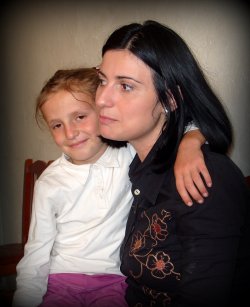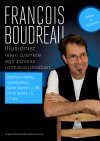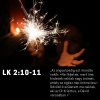
Vérbosszú Albániában
2012-10-23

Dermesztő történeteket hallottunk a családoktól, akik házi börtönükben élnek évek óta, mert nem merik elhagyni otthonaikat a vérbosszuló miatt. Halálos ítélet alatt állnak. Mint az a férfi, aki sok éve élt elzárkózottan, végül nem bírta idegekkel, egy hónapja megölte saját kislányát, majd öngyilkos lett. Az anya a másik három gyerekkel ott volt velünk az istentiszteleten. Vagy mint az a 22 éves fiú, aki látogatta a gyülekezetet, és ígéretet tett a pásztornak, hogy segíteni akar a vérbosszú miatt létrehozott alapítvány munkájában, de néhány hete hatvan lövéssel a nyílt utcán kivégezték. A temetésén a pásztor megemlítette az elhatározását a testvérének, aki erre csak annyit mondott: az események felülírták azt. A vér bosszúért kiált. És ő meg fogja bosszulni a testvérét.
Vagy mint az a feleség, akinek a pásztor férjét akkor ölték meg a város főterén éppen két éve, amikor a gyerekeit az iskolába vitte. Elona a bosszú helyett a megbocsátást választotta, és úgy döntött, megtöri a démoni kört. Szembeszegül a fogat fogért, életet életért ősi törvényével, és gyakorolja, amit Jézustól tanult: nem fizet a rosszért rosszal. Férje halála után nem sokkal átvette a gyülekezet vezetését, és létrehozta az említett alapítványt, amely a vérbosszú árnyékában élő családokat látogatja és segélyezi. Elmondja azt is, milyen célokat tűztek ki maguk elé. Elsősorban szellemi hadviselést folytatnak a vérbosszú ellen, rendszeres imádkozással és más gyülekezetek bevonásával. Másodsorban petíciót fogalmaztak meg a kormány felé, amelyben kérik, hogy a kormány érdemben foglalkozzon a vérbosszú problémájával, és hogy nyilvánítsák október 8-át a vérbosszú áldozatainak napjává (Elona férjének, Taninak a halála napja). Harmadsorban pedig szeretnék ellátni a vérbosszúban érintett családok lelki tanácsadását, amelynek része a családok közti békéltető szerep is.
Elona, a megölt lelkész fiatal özvegye és két kiskorú gyermek anyja, elmondta, hogy csak az elmúlt két hónapban tizenhat halálos áldozata volt a vérbosszúnak Észak-Albániában. A legfiatalabb egy kilencéves kisfiú volt. A Krisztus Szava gyülekezet rendszeresen tart demonstrációkat a városban. Néhány hete a véradás világnapján azzal vétették észre magukat, hogy szinte minden tag adott vért a felállított sátorban, ezzel is hirdetve, hogy a vért adni és nem elvenni kell (a vérbosszú albánul: vért elvenni). Még aznap kora este megöltek egy nagyapát a tizenhét éves lányunokájával, akik a mezőn dolgoztak. Az áldozatok valamennyien ártatlanok voltak, mert a vérbosszú során nem a gyilkost ölik meg, hanem kiválasztanak egy ártatlan embert a gyilkos nagycsaládjából.
A vérbosszú eredete a középkorig nyúlik vissza. Amikor a törökök erőszakkal iszlamizálták a keresztény – nagyrészt katolikus – lakosságot, azok, akik nem voltak hajlandók áttérni, elmenekültek az északi nagy hegyekbe. Választott vezetőik az Ószövetséghez hasonló törvényeket írtak számukra, és a fogat fogért, szemet szemért elvet alkalmazták. Ebből alakult ki az a tradíció, amely a legnagyobb szégyennek tartja, ha az áldozat családja nem bosszulja meg a gyilkosságot. Az áldozat anyjának kötelessége, hogy minden alkalommal, amikor asztalhoz ül a család, emlékeztesse őket a vér megbosszulására. A meggyilkolásra kiszemelt ember csak abban az esetben van biztonságban, ha nem lép ki a házából. Így ma is háromezernél több ember él házi börtönében; sok helyütt tíz-tizenkét család él egybezsúfolódva egy házban. A hatóságoktól semmiféle védelmet nem remélhetnek; azon túl, hogy a gyilkosokat jó esetben elfogják és hosszabb rövidebb időre börtönbe zárják, a szívekben-elmékben összegyűlt bosszúvágyat ez nem elégíti ki: a vér továbbra is vérért kiált.
Szakály Csaba
Blood is to be revenged
Allahu akbar… sings the muezzin, and the speaker of the minaret amplifies the prayer making it thousands of times louder. The magnificent mountains around the town reverberate the sound of the song. We are in Shkodra, the biggest town of North Albania, on the land of hatred and revenge, where blood feud still daily, weekly claims for its victims and makes people murderers and mourners.
We have heard terrible stories from families who have been living in their home-prison for years because they do not dare to leave them homes fearing the blood feud. They are under ‘death sentence’. Like the man who had been living separated for many years and eventually could not stand it anymore and a month ago killed his own daughter and committed suicide right after. The mother and the three other children were with us at the church service. Or like that 22-year-old boy who visited the congregation and promised the pastor that he will help the work of the foundation established because of the blood feud, but was killed on the street with sixty bullets a few weeks ago. The pastor mentioned the plans of the died boy to his brother at the funeral but the later merely answered: the events overwrote it. Blood is to be revenged. And he will take revenge for his brother.
Or like the wife, the pastor husband of whom was killed at a central square exactly two years ago when he was taking his children to school. Instead of revenge, Elona chose forgiveness and decided to break the vicious circle. She turns against the ancient law of ‘an eye for an eye, a tooth for a tooth’ and does what she has learnt from Jesus: ‘does not repay anyone evil for evil’. A few years after the death of her husband she became the leader of her congregation and established the named foundation which visits and supports the families living in the shadow of the blood feud. She also tells us what goals they have set forth. First of all, they do a spiritual warfare against blood feud with regular prayers and the involvement of other congregations. Secondly, they wrote a petition towards the government asking it to deal seriously with the problem of the blood feud and to declare 8th October Day of the Victims of Blood Feud (the day when Elona’s husband, Tani died). And thirdly, they aim to give spiritual advice to the blood feud affected families, a part of which is to play a conciliatory role between the families.
Elona, the young widow of the killed pastor and mother of two under age children said that blood feud resulted in sixteen deaths in the last two months only in North Albania. The youngest of them was a nine-year-old boy. The Word of Christ church makes regular demonstrations in the town. A few weeks ago, on the World Blood Donor Day, they made themselves seen by almost all of their members giving blood in the constructed tent spreading the message that blood needs to be given and not taken (the literal translation of the Albanian term for blood feud means: take blood). On the same day, early in the evening a grandfather was killed with his seventeen-year-old granddaughter who were working on the field. All of the victims were innocent as, instead of the killer, a member is chosen under blood feud to be killed from his wider family.
The origins of blood feud can be traced back to the middle ages. When the Turkish were islamising the Christian – mostly Catholic – population by force, those who were not willing to convert escaped to the high northern mountains. Their chosen leaders gave them laws similar to those of the Old Testament and used the ‘an eye for an eye, a tooth for a tooth’ principle. This was the root of the tradition which considers it the gravest shame if the family of the victim does not take revenge for the murder. It is the obligation of the victim’s mother to remind the family each time they eat together to carry out the blood feud. The person chosen to be killed is safe only if he or she does not leave his or her home. Thus, now more than 3.000 people live in their house-prisons; in many cases ten-twelve families are crowded into a house. They cannot expect any kind of help from the authorities, except that the murderers might be arrested and be kept in prison for a while. This does not satisfy the vengefulness accumulated in the hearts and minds: blood keeps asking for blood.
Csaba Szakály

Idén is Savaria történelmi karnevál...
2025-07-09
Hamarosan dunántúli gyerektábor
2025-07-09
Véget ért a 2025-ös angol tábor
2025-07-09

Keresztény angol tábor 2023
2023-03-21

Keresztény angol tábor 2022
2022-04-28
Húsz évvel ezelőtt alakult meg Szombathelyen a baptista gyülekezet
2018-09-27

Baptista ünnepi hét
2018-09-09

2018. június hónap igéje
2018-06-03

Vágylak látni téged Jézus dunántúli gyermektábor
2018-05-06

2018. május hónap igéje
2018-05-06

Isten üzenete egy bűvész tolmácsolásában…
2018-04-05

2018. április hónap igéje
2018-04-05

2018. március hónap igéje
2018-03-15

20 éves a Szombathelyi Baptista Gyülekezet
2018-02-21

A szexualitás ajándéka és a valóság
2018-02-03

2018. február hónap igéje
2018-02-03
Ökumenikus imahét programja
2018-01-19

2018. január hónap igéje
2018-01-13
Aliansz imahét
2018-01-05

Áldott ünnepeket kívánunk!
2017-12-24
Szombathelyi Baptista Gyülekezet - http://baptistaszombathely.hu - bizonyos jogok fenntartva - licenc